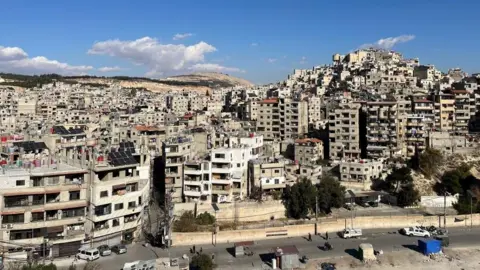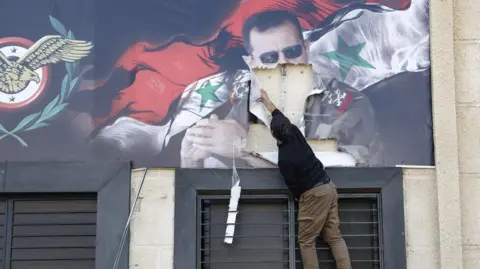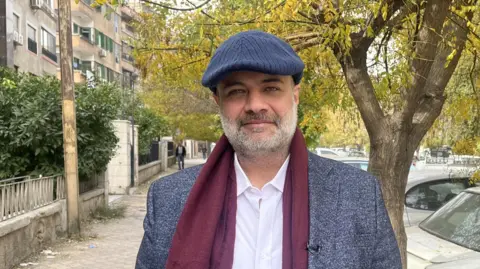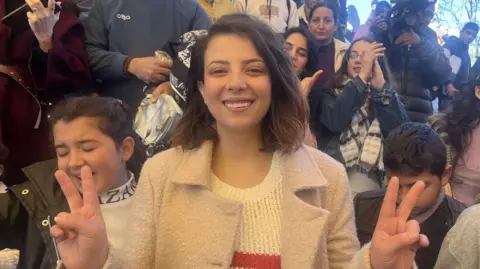Syria’s minorities seek protection as country plans new future

 aamir pirzada
aamir pirzadaDriving into Mezzeh 86, a working-class neighborhood west of Damascus, we are waved through a checkpoint manned by Hayat Tahrir al-Sham (HTS) fighters.
The buildings are dilapidated and in need of repair.
The region is dominated by Bashar al-Assad’s Alawite sect, a branch of Shia Islam whose members form one of Syria’s largest religious minorities.
Alawites controlled power in the predominantly Sunni Muslim country during the Assad family’s 50-year rule and held top positions in the government, military and intelligence services.
Now, many in the community fear reprisals after the Assad regime was overthrown by rebels led by HTS, a Sunni Islamist group that was once affiliated with al-Qaeda in Syria.
 EPA
EPADozens of Alawites we contacted by phone declined to speak to us, many saying they were afraid.
In Mezeh 86, the presence of HTS fighters at the checkpoint did not seem to be a source of concern.
Many Alawites came and spoke to us – those who were keen to distance themselves from Assad’s regime.
“During the Assad regime, the stereotype about Alawites was that they got all the work opportunities and were rich. But, in reality, most Alawites are poor and you will only find one in a thousand who is rich,” he said . Mohammad Shaheen, 26, a pharmacy student.
“Even when HTS went to Alawite villages near the coast, they found that all the villages were poor. Only the Assad family acquired property,” he said, referring to the Alawite stronghold in the country’s west.
Hassan Dawood, a shopkeeper, said: “We were his slaves – drivers, cooks and cleaners.”
There is also a feeling of betrayal.
Mohammed said, “Bashar was a traitor. And the way he ran away was cowardly. He should have at least addressed the people and told us what was happening. He left without saying anything, making the situation chaotic.” It’s done.”
But people from the Alawite community, and indeed people from this neighborhood, served in Assad’s brutal security forces. We asked, do they fear reprisals against them?
Thayer Shaheen, a construction worker, said, “People who were in the army and did bad things have fled. No one knows where they are. They are afraid of revenge.”
“But those who do not have blood on their hands are not afraid and have stayed here.”
There have been reports of some reprisal killings in some parts of the country, but there is no evidence yet to suggest that they were carried out by HTS.
“So far, we are fine. We are talking to Hayat Tahrir al-Sham and they are respectful. But there are people who are not from HTS but pretend to be them who are making threats. They want Our society should fail and they are the ones we fear,” Mohammed said.
After taking control of Damascus, HTS and its allies said those within the ousted regime who were involved in torture and killings would be held accountable, although it is not yet clear what form that justice will take.
HTS also said that the rights and freedoms of religious and ethnic minorities would be protected.
The group has a jihadist past from which it has distanced itself. But it has an Islamist presence, and many are asking what it will mean for Syria’s pluralistic society.
 Yogita Limaye
Yogita LimayeYoussef Sabbagh, a Christian lawyer, said, “I’m very happy because the Assad regime fell. It’s like a dream come true. No one wants to live under a dictatorship. But there is concern. I have to be realistic.”
“HTS is here now, and they are an Islamic militia. That’s what they are. I want, I pray they become a modern Islamic militia.”
“I’m speaking not just as a Christian, but as a lot of Syrians, Muslims and everybody, we don’t want Syria to become another Afghanistan, we don’t want to become a new Libya. We’ve already suffered too much. Are.”
Syria’s Christian community is one of the oldest in the world, with some famous holy sites in the country.
When the rebellion against Assad began in 2011, Christians were initially cautious about taking sides, but eventually members of the community fought on both sides of the conflict.
Last week, the Archbishop of Homs, Jacques Murad, told the BBC that three meetings had already taken place with HTS, and they were able to express their views and concerns honestly.
So far, the signs are reassuring for many Christians.
Bars and restaurants serving alcohol are open in the Christian Quarter of Old Damascus and other parts of the city. Christmas decorations are also being done at many places.
At a restaurant in the Old City we met lawyer Ouday al-Khayyat, a Shia Muslim.
He said, “There is no doubt that there is anticipation and concern. The signals coming from HTS are good, but we must wait and see.”
“It is not possible to know the opinions of all Shias but there are concerns about a scenario like Libya or Iraq. However, I believe Syria is different. Syrian society has been diverse for a very long time.”
 Yogita Limaye
Yogita LimayeWe drove through the black volcanic hills to the city of Suwayda, home to most of Syria’s Druze population, about 110 km (70 miles) southeast of Damascus.
The Druze faith is another branch of Shia Islam, but has its own distinct identity and beliefs.
Many Druze were loyal to the Assad regime, believing that he would protect the minorities.
But opposition grew steadily during the war and there have been frequent protests in recent years.
The latest incident began in August 2023 in the central square of Suwayda and continued until the fall of the regime.
Activist Wajiha al-Hajjar believes the protests were not brutally cracked down on like others in Syria, because Assad wanted to show the world and his foreign allies that he was protecting minorities.
“They tried to suppress our protests but in a different way – not through weapons or shelling, but by denying us passports and access to civil rights and official documents. Suwayda became difficult to leave and a kind of siege. Granted,” she said.
Hundreds of people still gather at the intersection every day. When we went there there was a celebratory atmosphere. Songs were playing over loudspeakers, and young girls and boys were performing gymnastics, with their families clapping and cheering them on.
“We are celebrating the fall of the regime, but this gathering is also a show of strength. In a situation when there is an extreme regime with extreme laws, we want to be on this square and demand our rights and demand equality.” Are ready for.” Wajiha said.
Suwayda enjoyed semi-autonomous status under Assad, and the Druze want that to continue.
This is just one example of the diversity and complexity of Syrian society and the challenges facing the country’s new government.
Additional reporting by Aamir Pirzada, Leanne Al-Saadi and Sanjay Ganguly






